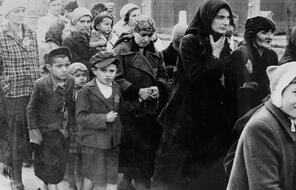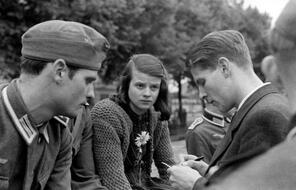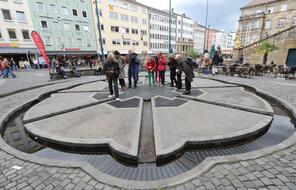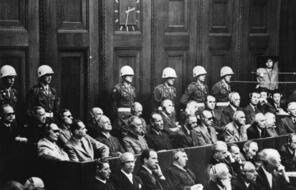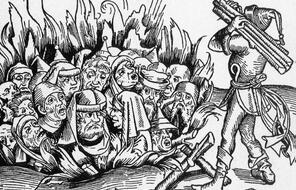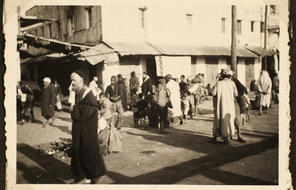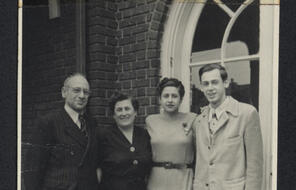Survivors and Memory
At a Glance
Language
English — USSubject
- History
- Social Studies
- Human & Civil Rights
- The Holocaust
Explore the Collection
Bring the stories of survivors into your classroom with our Survivors and Witnesses collection.
The legacy of World War II and the Holocaust is visible in the new laws, new international institutions, and even new religious teachings that were created after the end of the war. The memories and stories of those who lived through and survived the Holocaust form another kind of legacy, less tangible but equally important.
The voices of survivors have become a central part of how we understand the Holocaust. Today there are hundreds of memoirs on library shelves and thousands of hours of recorded audio and video testimony in archives. After the war, these stories emerged only slowly. Some survivors preferred to remain silent or were discouraged from speaking; for others, sharing their experiences was simply too painful. And for many survivors, the desire to tell their stories was outweighed by the belief that those who weren’t “there”—in the ghetto, in hiding, in the camps—could never truly understand. Author Elie Wiesel has said, “Only those who were there will ever know, and those who were there can never tell.” 1 Sonia Weitz, a poet who survived five camps, prefaced her memoir by asking, “But how does one bear witness to the unspeakable? . . . Normal standards do not apply to the Holocaust. Even language fails and words like hunger, fear, hot, cold, and pain lose their meaning. In fact, the Holocaust is a crime without a language.” 2
The Italian scientist and author Primo Levi, who survived Auschwitz, wrote of how “[t]he need to tell our story to ‘the rest’, to make ‘the rest’ participate in it, had taken on for us, before our liberation and after, the character of an immediate and violent impulse, to the point of competing with our other elementary needs.” 3 But even when they could find the words to speak, there was the fear that no one would listen. In one of his memoirs, Levi describes a recurring dream from his time in Auschwitz:
- 1Quoted in Walter Laqueur and Judith Tydor Baumel-Schwartz, The Holocaust Encyclopedia (New Haven: Yale University Press, 2001), 208.
- 2Sonia Schreiber Weitz, I Promised I Would Tell (Brookline, MA: Facing History and Ourselves, Inc., 2012), x.
- 3Primo Levi, Survival in Auschwitz: The Nazi Assault on Humanity (New York: Simon & Schuster, 1996), 9.
Samuel Bak, The Family, 1974
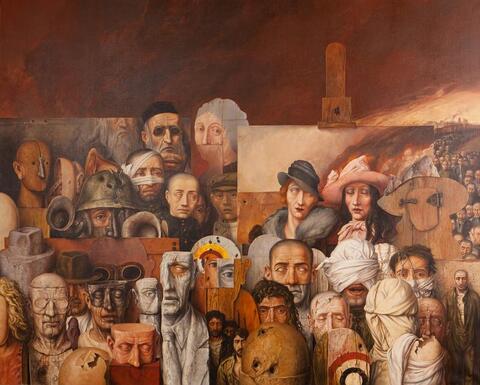
Samuel Bak, The Family, 1974
Holocaust survivor Samuel Bak, whose artwork reflects his experience of the Holocaust, dedicated this painting to the memory of the perished members of his family.
Explore the Collection
Learn more about Holocaust survivor Samuel Bak's artwork with our resource Illuminations: The Art of Samuel Bak.
This is my sister here, with some unidentifiable friend and many other people. They are all listening to me and it is this very story that I am telling: the [train] whistle of three notes, the hard bed, my neighbor whom I would like to move but whom I am afraid to wake as he is stronger than me. I also speak diffusely of our hunger and of the lice-control, and of the Kapo who hit me on the nose and then sent me to wash myself as I was bleeding. It is an intense pleasure, physical, inexpressible, to be at home, among friendly people and to have so many things to recount: but I cannot help noticing that my listeners do not follow me. In fact, they are completely indifferent, they speak confusedly of other things among themselves, as if I was not there. My sister looks at me, gets up, and goes away without a word . . .
[I awake and] [m]y dream stands in front of me, still warm, and although awake I am still full of its anguish: and then I remember that it is not a haphazard dream, but that I have dreamed it not once but many times since I arrived here, with hardly any variation of environments or details. I am now quite awake and I remember that I have recounted it to Alberto [a friend] and that he confided to me, to my amazement, that it is also his dream and the dream of many others, perhaps of everyone. Why does it happen? Why is the pain of every day translated so constantly into our dreams, in the ever-repeated scene of the unlistened-to story? 4
Levi’s troubling dream that no one would listen to his story was a reality in the lives of many survivors, especially in the years immediately after the war. Sonia Weitz describes how she began to talk about her Holocaust experiences years after her emigration to the United States:
I was nineteen years old when I began a new life in the United States. At that time, most Americans did not want to hear about the experiences of Holocaust survivors. (The word Holocaust was not even part of the vocabulary.) And most survivors did not have the will to talk about it, except among themselves. When some of us did break the silence and speak out, no one truly listened. Later, much later, some did listen, but very few heard. And so, in the beginning, I did not speak out. I concentrated, instead, on building a normal life. But what constituted a “normal life” to a survivor of the Holocaust? The young people I met in 1948 came from another world. They had grown up with their families, lived in houses, slept in beds, eaten three meals a day, and gone to school. I, on the other hand, had been starved and brutalized . . . During the 1950s and 1960s, I lived my life in much the same way as other American wives and mothers, at least to outward appearances. My inner world, however, differed dramatically. Over and over again, I heard my mother’s final words to me, “Remember to tell the world.” But how was I to do this? How was I to tell a world that did not want to listen? How was I to speak of the unspeakable—words that I myself did not want to hear? . . . 5
In the late 1970s, Weitz became aware of groups that were denying that the Holocaust had ever taken place. Despite the volumes of evidence, historical writings, and the testimony of survivors, Holocaust denial was on the rise. Weitz was moved to speak out:
When I first learned that historical revisionists were promoting books which claimed that the Holocaust had not taken place, I thought, “This must be a joke. How could seemingly intelligent people deny an event that had been so thoroughly documented by the murderers themselves?” . . . Later, in desperation, I consulted a lawyer. He seemed to understand my outrage and seriously suggested that I sue for defamation of soul. I felt a little better. I calmed down. Then, I began to think about the indignity of having to defend an undeniable truth, and I decided against legal action. But I had to do something! I could not remain silent! “Well, I’ll do it my way,” I told myself. “After all, I do have a weapon. I am a survivor, an eyewitness, and it is about time that I speak out.” 6
Whether they share their stories or prefer to keep silent, survivors live with the memory of their experiences. Isabella Leitner, a Hungarian survivor of Auschwitz, wrote about what the month of May means to her each year:
May is such a “big” month . . . May 1st is my sister’s birthday. There is something special about being born on May 1st, and dear little Rachel is special. There is something special about being born any time in May—May 1st, May 28th. The scent of spring is delicious. It permeates the air. It sings the song of birth, of life. All is drenched in sun. The earth smiles. It is happy you are here.
The world ended in May. I was born in May. I died in May. We started the journey of ugliness on May 29th. We headed for Auschwitz. We arrived on May 31st. The scent of spring wasn’t delicious. The earth didn’t smile. It shrieked in pain . . .
For more than twenty years I have walked zombie-like toward the end of May, deeply depressed, losing jobs, losing lovers, uncomprehending. And then June would come, and there would be new zeal, new life.
Now I am older, and I don’t remember all the pain, and June hurts, and so does May. May laughs sometimes, and so does June, and now in May I bend down to smell the flowers, and for moments I don’t recall the smell of burning flesh. That is not happiness, only relief, and relief is blessed. Now I want to reinstate the month of May. I want to reincarnate the month, reincarnate the dead. I want to tell my mother that I kept her faith, that I lived because she wanted me to, that the strength she imbued me with is not for sale, that the god in man is worth living for, and I will make sure that I hand that down to those who come after me. 7
Survivors did hand down their personal histories to their children and grandchildren, in ways that were planned, as Leitner describes, and also unplanned. Old photos of unknown family members, a mother’s insistence that her children always finish their dinner, a tattooed number glimpsed on a grandfather’s arm—these were some of the ways that survivors’ descendants gained awareness of their family history. Author Eva Hoffman was born in Poland just after World War II ended, to parents who had survived the Holocaust. She writes:
In my home, as in so many others, the past broke through in the sounds of nightmares, the idiom of sighs and illness, of tears and the acute aches that were the legacy of the damp attic and of the conditions my parents endured during their hiding . . .
Many others who grew up in households like mine remember the torn, incoherent character of those first communications about the Holocaust, the speech broken under the pressure of pain . . . For it was precisely the indigestibility of these utterances, their fearful weight of densely packed feeling, as much as any specific content, that I took in as a child. The fragmentary phrases lodged themselves in my mind like shards, like the deadly needles I remember from certain fairy tales, which pricked your flesh and could never be extracted again. 8
This emotional legacy of a parent’s trauma could be a burden. Sara Greenberg, the granddaughter of survivors, describes how it could also be a treasured inheritance:
A family’s history will echo from generation to generation as stories from the past are retold. My grandparents are survivors of the Holocaust . . . As a young child I had always noticed the number on my grandfather’s arm. What did it mean? Why didn’t other grandparents have a number? . . . It was important to him that I understand and that I learn from his story . . .
I have heard and told my grandfather’s story numerous times. I have vowed to never forget his story. But watching my grandfather address a group of Israeli soldiers, his heroes, in [Auschwitz], a place where over a million Jews were annihilated, his story suddenly took on a new meaning. As the last living link to survivors of Auschwitz and the Holocaust, it is my generation’s responsibility to tell the story of our grandparents. No other generation can ever touch a forearm branded with a numbered tattoo. No other generation can ever walk through the barracks of Auschwitz personally accompanied by stories of what it looked like, what it smelled like. We, the third generation, have the obligation to transmit our grandparents’ stories to the world and to future generations. May we never forget. 9
Connection Questions
- What do the survivors’ testimonies in this reading suggest about how the experience of living through the Holocaust shaped these survivors’ identities? How did it shape their children’s and grandchildren’s identities?
- What has made many Holocaust survivors decide to talk about what they have experienced? What has telling their stories meant for them? Why might other survivors choose not to share their experiences?
- Why do you think Primo Levi and his fellow prisoners dreamed so often of the “unlistened-to story”? What might that dream have to do with their experiences in the past? With their expectations of the future?
- How does Samuel Bak’s painting The Family echo the stories of loss and survival shared in this reading? How does it add to your understanding of what it might mean to be a survivor of the Holocaust?
- Have you ever heard a Holocaust survivor speak? If so, what stood out to you in that experience? What would you want to ask a survivor if you had the chance?
- What can we learn from the stories of survivors of the Holocaust or of the mass atrocities that have occurred since? How might their stories help us to better understand those moments of history? How might they help us to better understand human behavior?
- 4Primo Levi, Survival in Auschwitz: The Nazi Assault on Humanity (New York: Simon & Schuster, 1996), 60.
- 5Sonia Schreiber Weitz, I Promised I Would Tell (Brookline, MA: Facing History and Ourselves, Inc., 2012), 87.
- 6Sonia Schreiber Weitz, I Promised I Would Tell (Brookline, MA: Facing History and Ourselves, Inc., 2012), 88–89.
- 7From Isabella Leitner and Irving A. Leitner, Fragments of Isabella: A Memoir of Auschwitz (New York: Crowell, 1978), 94.
- 8Eva Hoffman, After Such Knowledge: Memory, History, and the Legacy of the Holocaust (Perseus Books, 2004), 9–11.
- 9Sara Greenberg in B-2247: A Granddaughter's Understanding, directed by Sara Greenberg (2012), streaming video.
How to Cite This Reading
Facing History & Ourselves, "Survivors and Memory," last updated August 2, 2016.


